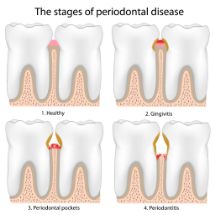 When you think about keeping your heart healthy, you probably think about diet, exercise, and stress management. But did you know that people with gum disease have nearly double the chance of developing heart problems? Gum disease (also called periodontal disease) affects millions of people and, in addition to being linked to heart health, is also the leading cause of tooth loss. After reading this blog, you’ll have a better understanding of how your gums and heart are related and get tips for keeping both healthy at the same time!
When you think about keeping your heart healthy, you probably think about diet, exercise, and stress management. But did you know that people with gum disease have nearly double the chance of developing heart problems? Gum disease (also called periodontal disease) affects millions of people and, in addition to being linked to heart health, is also the leading cause of tooth loss. After reading this blog, you’ll have a better understanding of how your gums and heart are related and get tips for keeping both healthy at the same time!
What’s the Link Between the Gums and the Heart?
Many people think of the mouth as something separate from the rest of the body, but the truth is that everything is connected. There have been many studies in recent years on the mouth-body connection and research is ongoing. While the link isn’t entirely clear, researchers think that bacteria and inflammation are the connecting factors.
Plaque and tartar, which are mostly bacteria, accumulate under the gumline where they can be hard to remove. This is harmful for multiple reasons: First, it causes inflammation and infection, eventually leading to gum disease. Symptoms include bleeding or swollen gums, tenderness when flossing, chronic bad breath, and (in advanced stages) loose teeth.
Also, these bacteria easily enter the bloodstream from under the gumline and travel throughout the entire body, including the heart. This does the same thing in the heart that it does in the mouth: cause inflammation and plaque to form. However, in the heart, the result is hardened and narrowed arteries.
How Can You Keep Your Gums Healthy and Reduce Your Risk?
There are several simple things you can do to keep your gums healthy:
- Schedule regular checkups – Checkups and cleanings are a chance for your dentist to remove plaque and tartar from under your gumline and regularly examine your gums. This way, they can find gum disease as early as possible and recommend the appropriate periodontal therapy to manage it.
- Maintain great oral hygiene – Good oral hygiene habits are absolutely crucial for gum health, so it’s important to brush 2-3 times a day and floss daily. Tools such as an electric toothbrush and oral irrigator can be very helpful. And if any areas continue to bleed, that’s a sign to brush and floss that area more.
- Follow your dentist’s recommendations – Gum disease is similar to diabetes – it can be managed but not cured. By following your dentist’s recommendations and doing your part at home, you can keep this condition from progressing.
Gum disease has serious consequences to both your smile and heart health. But, with these guidelines, you can greatly reduce these risks.
About the Author
Dr. Bob Long is a family dentist who provides comprehensive dentistry aimed at better oral health and overall well-being. In addition to educating his patients about how their gums affect their heart, he also provides multiple types of gum therapy, including highly effective laser treatment. If you have any questions about your gums, he can be reached via his website.
